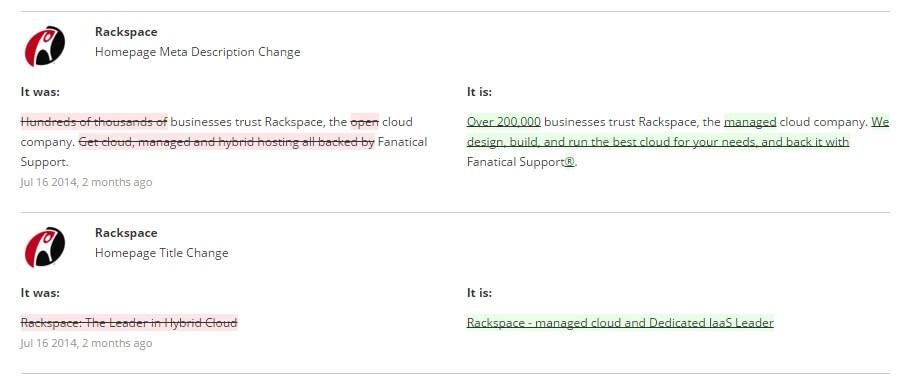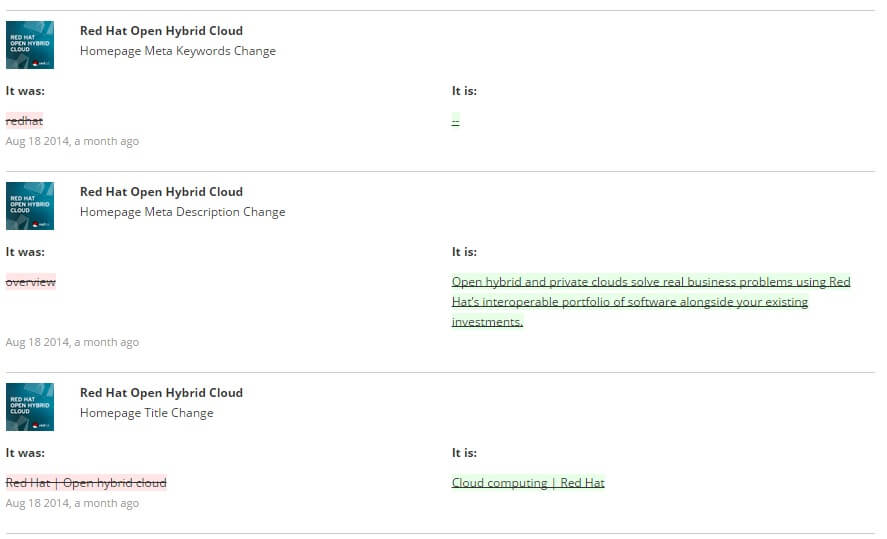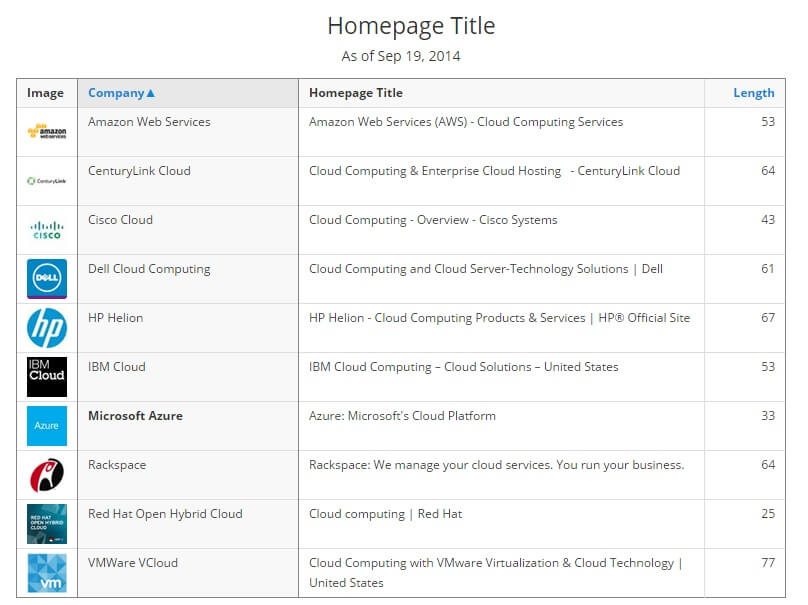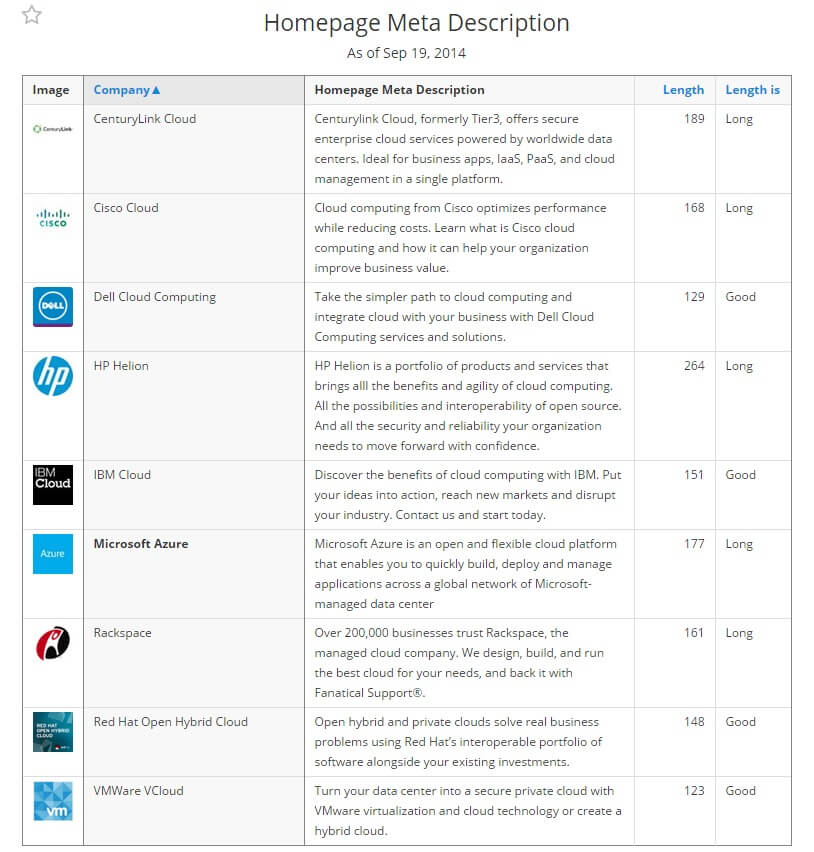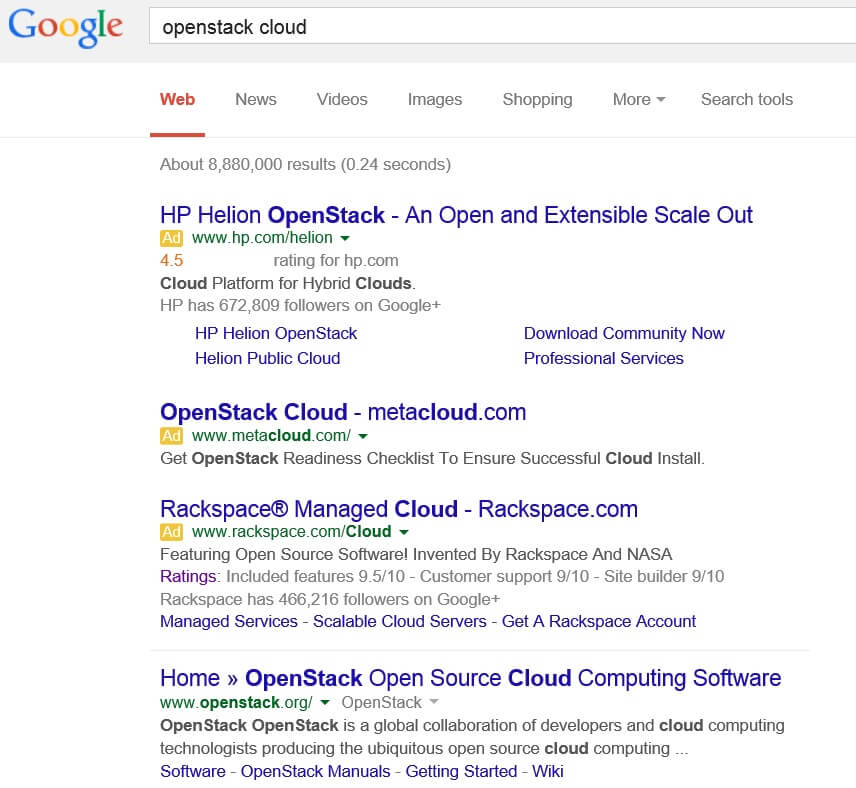 Few marketers have the time or inclination to track their competitor’s website meta description, meta title tags or social profiles in order to learn of changes or updates. But they should. By doing so, you gain incredible competitive intelligence about potential changes in strategy, market positioning and even product direction. You can also use this to track potential market trends or changes you might have missed.
Few marketers have the time or inclination to track their competitor’s website meta description, meta title tags or social profiles in order to learn of changes or updates. But they should. By doing so, you gain incredible competitive intelligence about potential changes in strategy, market positioning and even product direction. You can also use this to track potential market trends or changes you might have missed.
Recently, while reviewing a market landscape of cloud computing companies, I noticed some interesting changes and mistakes with website meta descriptions, meta title tags, meta keywords and social profiles. I realized it would make a great example of why you should track these changes across your own competitive environment.
Learning from the Good and Bad
I’ve been working in the cloud computing industry for many years now, and I love watching the trends in messaging, positioning and posturing among the different cloud providers. The landscape I created on Rival IQ to do this includes leading cloud names like Amazon Web Services, Rackspace, Red Hat, HP Helion, CenturyLink Cloud and other top players. What you’ll see is that even some of the biggest companies with large marketing budgets and teams don’t always follow best practices.
People Still Wondering “What is Cloud?”
Two different companies in this landscape made changes that imply a back to the basics approach toward cloud. There were other subtle changes from additional cloud vendors that added to this hypothesis. Specifically, AWS switched from a “contact support” approach to specifically stating in its Twitter profile “New to the cloud?” with a link that specifically answers the question: What is cloud?
VMWare actually put this into its Homepage Meta Keywords change in hopes of grabbing traffic for organic search results around What is cloud computing?
This is interesting for two reasons: one, because we can peek inside VMWare’s marketing head a bit; and two, because search engines stopped actually considering meta keywords a while ago, so best practice is keeping this blank (read more on Meta Keywords). Maybe someone can give VMWare the memo.
Actually, while you are at it, you might want to let Microsoft Azure know, too. They actually went from no keywords to adding keywords. Whoops! And not sure the purpose of having Azure twice?
Open, Hybrid, Managed? What are customers looking for?
Beyond cloud, there is clearly some wrangling going on within companies to figure out what exactly resonates with prospective customers searching for cloud services. Do they want “open” clouds? Do they like “hybrid” or even know what it means?
Case 1: Rackspace – What are they?
Rackspace has a great cloud portfolio, OpenStack expertise and a strong heritage in cloud hosting. However, clearly the last couple of months as they looked for a buyer, the positioning engine has sputtered a bit. First, in July, they moved away from the words “open” and “hybrid”, changing a key phrase in the Meta Description from Open Cloud Company to Managed Cloud Company. In the homepage title, it shows a shift from Leader in Hybrid Cloud to Managed Cloud and Dedicated IaaS Leader (IaaS stands for Infrastructure as a Service). The one consistent phrase remaining throughout is “Fanatical Support,” something Rackspace has used since almost the beginning.
But wait, there’s more: Then in August 2014, they changed the Homepage Title again. Removing Managed and IaaS Leader, and taking a simper approach with “We manage your cloud services. You run your business”. Again, more focused on being a managed services provider.
Big changes twice in two months? Not a good idea. Now the big question is: What happened to “open” and “OpenStack”?
Case 2: Red Hat – Open, Private and Hybrid!
Red Hat was on a mission in August. Good job on removing meta keywords – Red Hat clearly got the memo on that one. Also, a good idea to actually add words to the meta description. Red Hat moved from the completely non-search term of “overview” to a rich description including open, hybrid, private and cloud.
However, my initial reaction is that Red Hat is trying to “own” too many terms, which is hard to do. But then, as a seemingly opposite move, it removed open and hybrid cloud from its homepage title and changed it to the overarching “Cloud Computing” term.
Case #3: Vanilla “cloud computing” wins.
In spite of the many differentiators these companies are using in deeper messaging, they seem to all be optimizing for the SEO keyword“cloud computing”.
Also, there are still simple mistakes being made in this group of big companies. For example, you always want to put key terms first and then your company name. So AWS would be wise to change its homepage title to: Cloud Computing Services – Amazon Web Services (AWS), and IBM could change its title tags to Cloud Computing, Cloud Solutions – IBM.
What happened to OpenStack?
Many of these cloud providers have put their eggs in the OpenStack basket, and yet, no one seems to be wanting to optimize for search results on OpenStack-related search strings. OpenStack as a term is absent from the title tags and descriptions.
Ironically, however, when I do a quick Google search for OpenStack cloud, I see several of these same companies spending money on PPC ads with the term “OpenStack”. So, the OpenStack foundation is the first organic search results, which is great for the foundation, but I think some of the companies productizing OpenStack could also do better here.
Top 6 Learnings for Website Meta Descriptions & Social Positioning:
1. Remove your Meta keywords so you aren’t divulging everything to your competitors or wasting energy.
2. Keep your Meta Title tags between 50 – 60 characters AND put key words first in the Meta Title – then your company name. Here’s a great resource: http://moz.com/learn/seo/title-tag
3. Keep your Meta Description between 150 – 160 characters and use compelling keywords and phrases. While not important to SEO rankings, these descriptions are extremely important in gaining user click-through from SERPs. So, your meta description should use keywords that align with your overall strategy and also provide a compelling or differentiating story that will make an Internet searcher click.
4. Align your organic SEO keywords with your paid (PPC) keywords and focus. You can’t own every term, just like your product or service can’t be everything to everyone. What are the most important keywords for you to “own”? Remember that sometimes longer tail keywords are highly valuable, too.
5. Optimize your social profiles and use the maximum characters allowed by each network. Use hashtags when appropriate and your top positioning words and phrases. For example, Twitter allows about 155 characters for your profile – use it well!
6. Track your competitors’ positioning and messaging to make sure you are aware of their latest marketing strategies and that you are both maintaining relevance and differentiating yourself in the market. As a baseline, do a competitive communication audit, which I provide a template for in a previous blog.
Improve Your Website Meta Description & Positioning!
You can clone my Cloud Landscape here: http://bit.ly/1uYoDK2. When you do this, you receive a free 14-day trial, and your account is automatically pre-populated with the cloud computing landscape. Or, simply create your own landscape and start improving how you position your company across your Website and social profiles.





